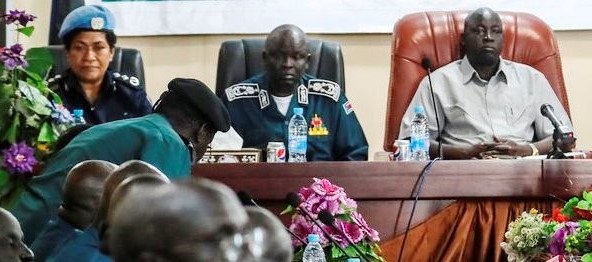A complete action plan for the National Police Service on addressing conflict-related sexual violence was launched in Juba on Tuesday.
Speaking at the launch of the action plan, James Dak Karlo, Head of the Special Police Units, said: “We have been a bit late, but now we are participating, and we will ensure fair play”.
Michael Chiangjiek, Interior Minister, emphasized the importance of turning words into actions. “Sexual violence has become epidemic in this country, and our police must take this action plan very seriously,” he said.
The minister stressed that access to justice must be guaranteed for all in the country, pointing out that impunity encourages others to commit crimes.
Key points of the document focus on disciplinary procedures, training on investigations into cases of conflict-related sexual violence, coordination with other organised forces, protection of victims and witnesses, educational messages to end stigma, among others.
“This issue [sexual violence] is controversial in South Sudan. There is at times a lack of acceptance [of it being a crime] among some police officers who feel that targeting sexual violence is something that comes from the international community,” said Huma Khan, the senior women’s protection officer serving with the United Nations Mission in South Sudan.
She pointed out that the country’s police leadership is keen on taking action against these actions, including by means of holding its own officers accountable, but noted that the response outside of Juba is often less understanding.
Guided by the Office of the Special Representative of the UN Secretary-General on Sexual Violence in Conflict, who in October 2014 signed a communiqué with President Salva Kiir committing the country to create action plans for its military and police forces, Huma Khan has given the government’s drafting committee technical assistance in producing the document.
“A lack of financial resources is the biggest challenge,” said Major General Stephen Warikozi Zakaria, chairperson of the committee which drafted the document.
He said most of the money will come from the government but added that donor support will be needed.




